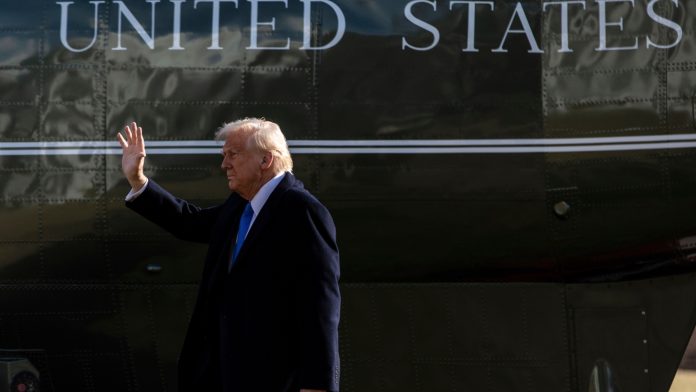President Trump walks on the South Lawn of the White House before boarding Marine One in Washington, D.C., on Friday.
Anna Rose Layden/UPI/Bloomberg via Getty Images
hide caption
toggle caption
Anna Rose Layden/UPI/Bloomberg via Getty Images
The question of who should have access to the nation’s secrets is one of the utmost importance. In the past two presidential terms, that question has been aimed at former presidents themselves.
In 2021, then-President Biden barred then-former President Donald Trump access to intelligence briefings, arguing that Trump could not be trusted because of his “erratic behavior.”

Since returning to office, Trump on Friday said he was doing the same to his predecessor, blaming Biden for setting the precedent and ending a courtesy traditionally provided to former presidents.
More specifically, Trump said he would immediately revoke Biden’s “security clearances,” though in reality, Biden did not have a security clearance to begin with.
“He didn’t have a security clearance in the way that folks in the military or intelligence agencies or the FBI have them, by going through the security clearance process,” said Dakota Rudesill, a law professor at the Ohio State University who has written about national intelligence and secrecy.
Here’s what to know about presidents and security clearances.
Presidents have access to secrets, but don’t receive formal security clearances
Most Americans, like federal workers or military personnel, need a formal security clearance before they can gain access to classified information or secured facilities. The process can include jumping through a number of hoops, from a background check to a polygraph test, depending on the tier. The purpose is to determine if a person can be entrusted with sensitive information.
But for the president, vice president, members of Congress, Supreme Court justices, and other government official positions outlined in the Constitution, that determination is not made by a federal investigator, but rather by election or appointment. Their access expires once they leave office.

Since returning to office, Trump on Friday said he was doing the same to his predecessor, blaming Biden for setting the precedent and ending a courtesy traditionally provided to former presidents.
More specifically, Trump said he would immediately revoke Biden’s “security clearances,” though in reality, Biden did not have a security clearance to begin with.
“He didn’t have a security clearance in the way that folks in the military or intelligence agencies or the FBI have them, by going through the security clearance process,” said Dakota Rudesill, a law professor at the Ohio State University who has written about national intelligence and secrecy.
Here’s what to know about presidents and security clearances.
Presidents have access to secrets, but don’t receive formal security clearances
Most Americans, like federal workers or military personnel, need a formal security clearance before they can gain access to classified information or secured facilities. The process can include jumping through a number of hoops, from a background check to a polygraph test, depending on the tier. The purpose is to determine if a person can be entrusted with sensitive information.
But for the president, vice president, members of Congress, Supreme Court justices, and other government official positions outlined in the Constitution, that determination is not made by a federal investigator, but rather by election or appointment. Their access expires once they leave office.




